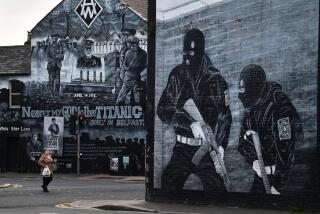Northern Ireland Violence Erupts After British Free Trooper Serving Life Term : Europe: Soldier was convicted in fatal shooting of a young Catholic woman. Sinn Fein says peace process threatened.
- Share via
LONDON — Violence flared Monday in Northern Ireland after the surprise release of a British paratrooper serving a life term for the fatal shooting of a young Roman Catholic woman at an army checkpoint in Belfast in 1990.
Demonstrators overturned and burned about 30 vehicles in West Belfast and protesters burned newspapers and held a rally in Londonderry. No serious injuries were reported.
Martin McGuinness, a senior strategist for Sinn Fein, the political arm of the Irish Republican Army, warned that freeing Pvt. Lee Clegg, 26, could threaten the Northern Ireland peace process, which has been aided by a 10-month cease-fire observed by paramilitary forces on both sides of the Northern Ireland conflict. The British army withdrew from Belfast streets last year as part of peace efforts.
“People here find this decision deeply insulting,” he said. “To take one prisoner out of a hundred who have been in prison as a result of a conflict in the North and elevate him above the rest is a disgraceful thing for the British government to have done.”
Sinn Fein Chairman Mitchel McLaughlin said, “Once again we see there is one law for members of the British forces and one for everyone else.
*
“This decision undermines confidence, removes trust and will increase the widespread unease which already surrounds Britain’s attitude to the peace process.”
Irish Prime Minister John Bruton said that he now expects British authorities to apply the same approach “to all other similar prison cases.”
Clegg’s release was recommended by the Life Sentence Review Board and signed by Northern Ireland Secretary Patrick Mayhew.
Clegg was a member of a British patrol that fired on a stolen car that sped through a checkpoint in Belfast. A passenger in the car, Karen Reilly, 18, was killed.
Clegg insisted he was only obeying orders, but he was accused of shooting after the car had passed the checkpoint and was no longer a danger. He was convicted of murder in 1993 and sentenced to life imprisonment.
Appeals of Clegg’s sentence failed, sparking an outcry among veterans organizations and in the newspapers; a senior judge asserted that the law had treated the soldier unfairly and should be changed.
New ballistic evidence reportedly indicated that the fatal bullet might not have come from Clegg’s rifle. A million signatures were collected calling for the soldier’s freedom.
*
Leading British politicians and military personnel expressed outrage that a life sentence was passed on a soldier for carrying out what he perceived to be his duty in what amounted to a war zone.
Sinn Fein leaders angered over Clegg’s release said IRA prisoners should also be freed.
The British government said Clegg’s release was for time served in a questionable prosecution, while IRA prisoners were in jail for specific terrorist crimes.
One member of the review board resigned in protest over the decision, which was reported to be 10-2 in favor of Clegg’s immediate release.
Clegg had been imprisoned in northern England while the appeals were under way. He left prison early Monday to join his 22-year-old wife and 3-year-old son and said he hoped to resume his military career.
In Belfast, Joe Hendron, a nationalist member of Parliament, said the government now should consider releasing republican and loyalist prisoners.
“There is dismay in my constituency,” he said. “The people are very, very angry, and I am speaking as someone who has opposed the IRA and all paramilitaries for the last 25 years.”
Sinn Fein leaders said Clegg’s release was timed to win parliamentary votes for Prime Minister John Major in today’s Tory party leadership election--a charge quickly denied by Major’s office.
More to Read
Sign up for Essential California
The most important California stories and recommendations in your inbox every morning.
You may occasionally receive promotional content from the Los Angeles Times.













